Despite the desperate attempts by the increasingly irrelevant media to call them "peaceful protests", they are riots and they're
occurring in most of America's large cities. Either order will be restored or we will see the re-emergence of what we've seen throughout history when life is precarious. While history is out of fashion and no longer taught in school, the lessons of history are clear - the
Gods of the Copybook Headings did not get their name by accident.
So what happens when people live precariously, under continual threat of violence? They flee to safer places.
This is an entrance to the underground city of
Derinkuyu in Turkey. There were many of these underground cities in the region; Derinkuyu was the largest, supporting as many as 20,000 people in five levels extending 200 feet underground. You might wonder why anyone would want to live underground in these conditions, or why they would have gone to that much trouble to excavate the city.
Well, it beats being slaughtered or enslaved by invaders. The eastern portion of the Roman Empire survived the Eternal City's 476 AD fall, but by the 650s was in big trouble from the new Islamic Caliphate. The
Emperor Heraclius had lost the richest part of the empire - Syria and Egypt, perhaps 75% of his tax base - to the Caliph in the 640s, and now annual raids were penetrating the heartland of the empire. And so the people dug, and hid.
Or fled. A new field of archaeology is called Palynology, the study of old, preserved pollen. It provides insight into the plants that existed in a location at a particular time in the past. Of course, you need a site that preserves the old pollen, and there are not a lot of them.
Lake Nar is one of them, and as it turns out, one of the best in the world for preserving pollen in a highly datable manner. The chemistry of the lake - fed by hot springs - causes alternating light and dark sediment bands to be laid down each year, so archaeologists can do exceptionally precise pollen analysis and dating. Lake Nar is only 15 miles or so from Derinkuyu. So what do we see, pollen-wise, in the 650s and 660s AD?
We see the complete collapse of the late antique agricultural economy of the region. The pollens had been representative of a typical late Roman agricultural profile - olives, grapes, and grain production dominated. Then in the space of ten years it shifted almost entirely to the kind of weeds you find in abandoned agricultural land. Then later it turned to forest.
Life was too precarious for the population. They were killed, or dragged off to slavery, or they left - some perhaps to dig more tunnels at Derinkuyu.
Now think about Detroit, Minneapolis, Portland, and New York City. Crime is way up, riots are a regular occurrence, the people are living precariously. What will they do?
Well, some will stay, and submit. For these, life almost certainly will be less prosperous than it had been. That means that there will be less to loot, or to skim off the top in extortion. The rioters are eating their seed grain, but having fun while they do it.
Others will fight back. We'll see how that goes when the Organs Of The State side with the rioters.
The ones who can will leave. That's
happening in New York City, which is losing their wealthiest citizens. That's a real problem for the local government, since the wealthiest 1% of the population pays half the income tax revenue. Heraclius lost most of his tax base, too, and the Empire was never the same again.
Civilized society is a very fragile thing. We've had fifty years where society was peaceful here in this land. People think that is a normal thing, that it can never change, that prosperity is a pre-existing condition for beautiful Progressive Dreams. But the rioters and looters are having fun, and are getting loot. Appetites are being established, appetites that are in conflict with the pre-existing prosperity required for the Progressive Dreams.
But people are people. History tells us what happens to a land where the government cannot keep the peace.
















